Why is coffee made at home always better than coffee made in a cafe?
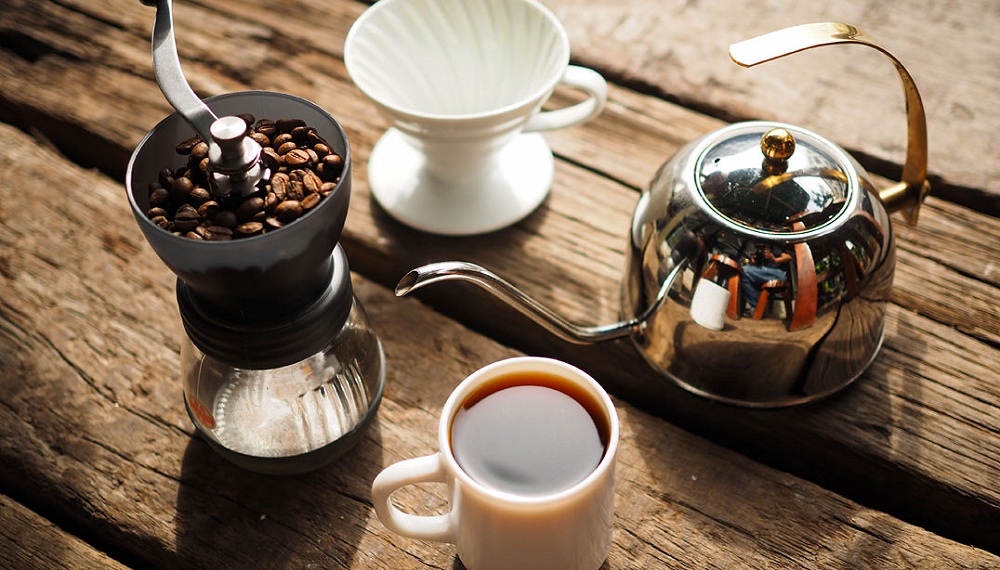
For professional baristas, please follow the coffee workshop (Wechat official account cafe_style)
How is the coffee made by a professional barista different from what you make at home?
In a new book on the principle of coffee Water for Coffee: Science Story Manual, Christopher Hendon, one of the authors and associate professor of computational materials and chemistry at the University of Oregon, explains the principle of coffee extraction from a chemical and physical perspective. In his view, professional baristas make better coffee, which of course has something to do with their well-trained and skilled skills, but a more important reason is that they know more about the principles of chemistry and physics and have more time to experiment with recipes.
For the average person, a cup of coffee contains 1.2% of the coffee ingredients (a mixture of organic acids, Maillard reaction products, aromatic esters, heterocyclic compounds, etc.) and 8% of the coffee ingredients. The former happens to be the percentage of most filtered coffee, while the latter corresponds to the composition ratio of Espresso espresso.
There are very few ways to extract 8%, 10% of the coffee ingredients, and espresso machines are the most common. But there are many ways to achieve 1.2% Mel 1.5% extraction ratio, such as hand-flushing, Turkish, Arabian, Aeropress, French pressure filtration, siphon or American drip filter coffee machine. The devices of these methods have one thing in common: they are all cheaper than Italian coffee makers. Of course, the espresso machine can also make 1.2% Mel 1.5% coffee-dilute a cup of espresso with hot water to get what we often call "American coffee" (Americano).

So the question is, since these coffee drinks have the same coffee content, why do they taste so different?
When coffee meets water
In the 1.2% Muay 1.5% camp, it is roughly divided into two groups, one is to soak all the coffee powder in water to extract, and the other is to let the water flow through the coffee powder, that is, "filter".
From a physical point of view, the water temperature of immersion is higher. In the process of coffee extraction, "the process of dissolving compounds from the surface of coffee particles into water" is not the slowest. In contrast, the process of "coffee flavor from the inside of coffee particles to the interface between water and coffee particles" takes more time. The increase in the temperature of the water will speed up the process.
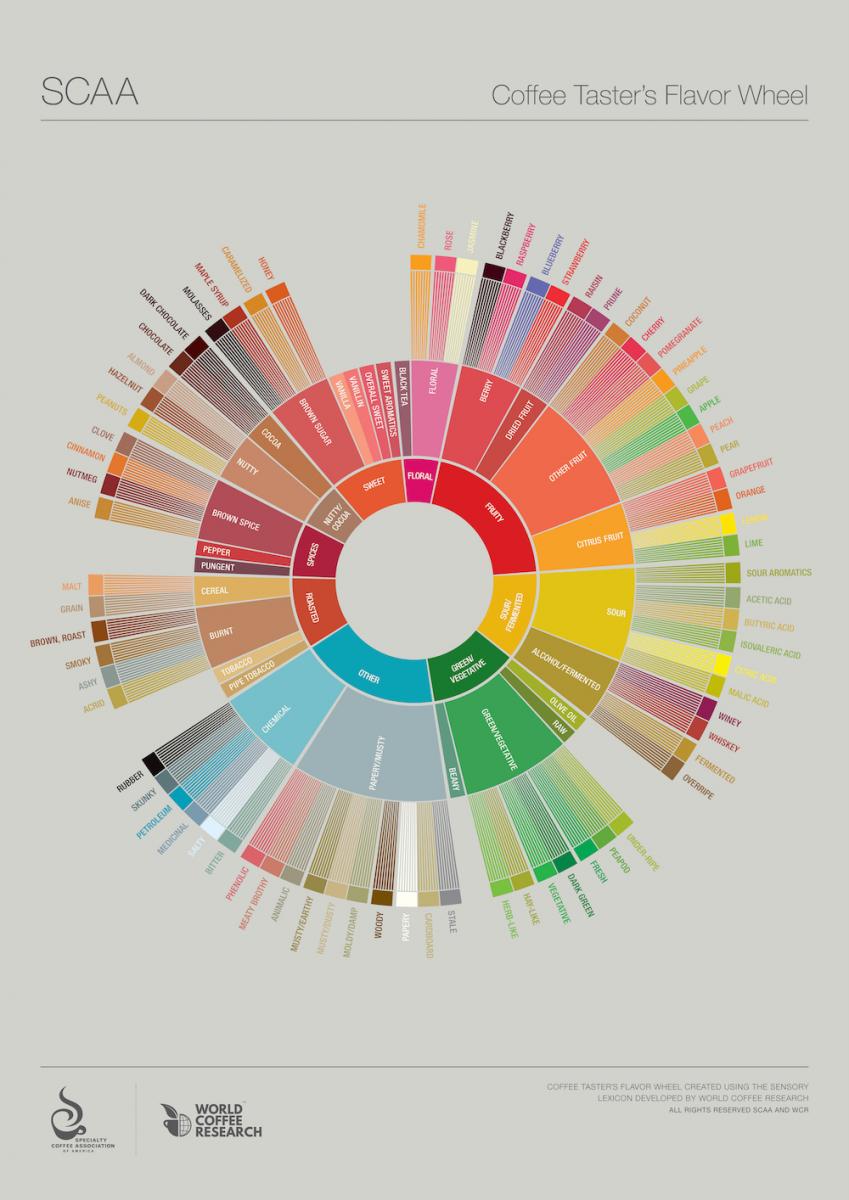
SCAA's coffee flavor wheel
Higher particle temperatures mean more coffee-scented compounds will be released, but high water temperatures can also cause many bad compounds to flow into the water. Specialty Coffee Association has published an odor wheel to help people analyze the aroma of coffee.
Coffee brewed by hand and other filtering methods is more complicated. The time of soaking can be controlled, while the extraction time of filtration depends on the thickness of coffee powder, because it directly affects the speed of water flow.
The ratio of coffee to water is also important. The finer the coffee powder, the more fully extracted, but the speed at which the water flows will be correspondingly slower. If you reduce the amount of coffee at this time, the extraction time will also be shorter than before-that is, filtered coffee is a chain reaction of "pulling together and starting the whole body", with more and more complex variables.
Other influencing factors
Even if you can fully master the steps of hand-brewing coffee and accurately copy a barista you like, it is still possible that you may not get the same taste. There are three factors that can affect the taste of coffee: water quality, the thickness of coffee powder, and the freshness of coffee.
First of all, water quality. Coffee is a sour drink, the acidity of the brewing water itself will greatly affect your product. Soft water with less soluble calcium and magnesium compounds will flush out coffee with higher acidity, while hard water, that is, water with more carbonic compounds, is more likely to make a cup of powdery coffee because carbonic acid neutralizes the cup with more flavor.
The ideal water quality is between too soft and too hard, but it is difficult to figure out whether a certain kind of water is soft or hard at home, and there is a way to do experiments: test it with French Evian water. The hardness of Evian water is 306mg/L, and the total soluble solid is 489. it is one of the water brands with the highest hardness on the market. Use Evian water and your usual water to make a cup of coffee at the same time, and then compare, you can roughly understand the water quality of your home.
Your bean grinder is also critical. The propeller bean grinder (blade grinders) is "rejected" by many people because the coffee powder it grinds is uneven; if there are conditions, it is best to choose a disc bean grinder (burr grinder), where two parallel gears grind each other, and the coffee powder is evenly ground.
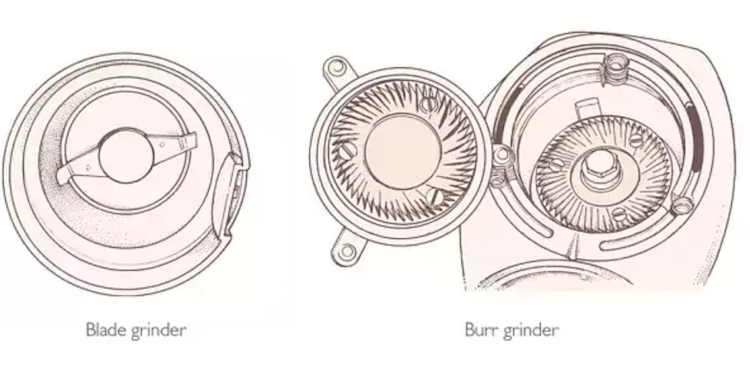
As for how fine it should be ground, there has always been a debate. Some people think that the finer the coffee beans are ground, the better, to maximize the surface area of the particles in contact with water, in order to extract the best coffee flavor; others say that the thicker the better, so as not to release astringency from excessive extraction. Is it thick or thin? This, you may still have to trouble you to adjust slowly according to your own taste.
Finally, the freshness of coffee is also critical. Roasted coffee contains large amounts of carbon dioxide and other volatile gases, which are slowly released from coffee beans. Most cafes do not try beans that have been roasted for more than a month, emphasizing the importance of fresh coffee. Freezing after sealing can significantly prolong the "outgassing" process of coffee to maintain its freshness.
So, if the coffee you make at home is not as good as it tastes good in the store, don't be discouraged. It's normal. But keep in mind that no chemical formula can compare with your own tongue, and it may be more important than any variable to make your own favorite taste through daily practice.
Important Notice :
前街咖啡 FrontStreet Coffee has moved to new addredd:
FrontStreet Coffee Address: 315,Donghua East Road,GuangZhou
Tel:020 38364473
- Prev
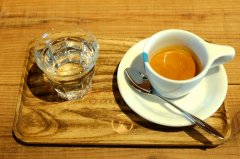
SOE single espresso explains what soe Coffee means the difference between SOE and ESP
For the exchange of professional baristas, please pay attention to the coffee workshop (Wechat official account cafe_style) single espresso (Single Origin Espresso). To put it simply, it is an espresso brewed with beans from a single producing area / manor. this kind of coffee has the characteristics and flavor of the producing area, which is similar to the espresso brewed by Blends from more than two producing areas.
- Next
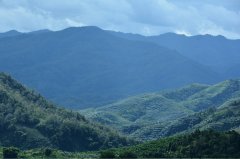
How to improve the skill of Coffee pattern drawing quickly what are the exercises about Coffee pattern drawing
How to quickly improve the skill of Coffee pattern the practice of Coffee pattern what are the basic skills of Coffee pattern is a skill improvement method that is highly valued by beginners or practitioners, even experienced baristas. What are the basic skills? It can be roughly summarized as follows: foam, selection of treatment exercises, fusion of injection exercises, shaking of cylinder nozzles, up and down practice diversion, front
Related
- What is the meaning of lactic acid fermentation with coffee bean treatment?
- How to judge the state of foam by sound?
- How does the latte pull out the unicorn pattern? Come to get for a little trick to improve the flower pull!
- Will flower pulling affect the taste of the latte?
- Do you know the history of coffee?
- The difference between honey treatment and sun washing what is raisin honey treatment?
- What kind of milk can a novice use to make coffee foam to keep the foam longer? The correct method and skills of milking tutorial sharing
- Why do washed coffee beans taste sour? Flavor characteristics of washed Coffee
- Introduction to the skill of how to practice the size and height of water injection around the circle of hand-brewed coffee
- How do beginners practice coffee flower drawing from scratch?

